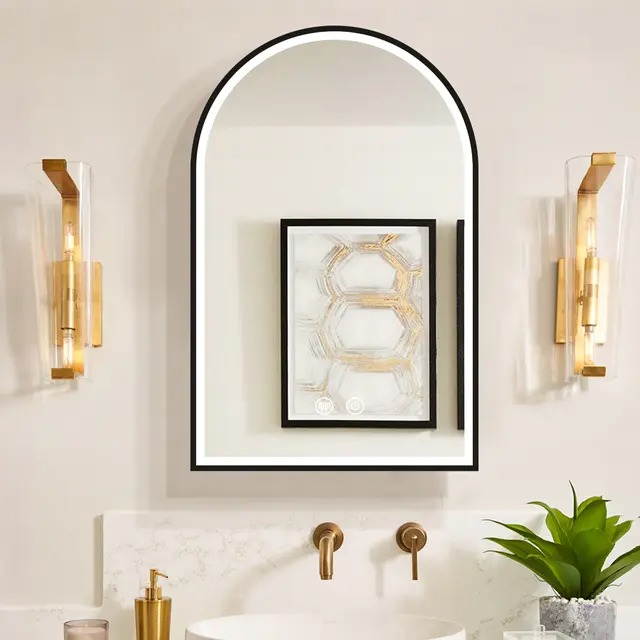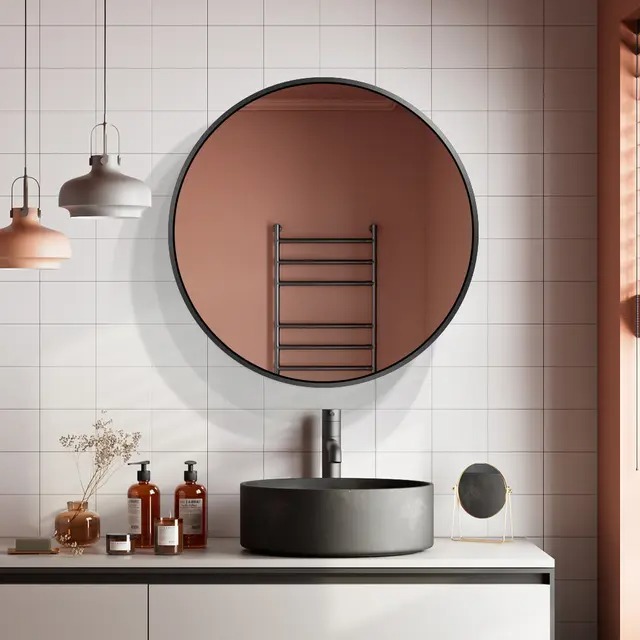

Views: 195 Author: Site Editor Publish Time: 2025-09-22 Origin: Site











A Mirror Cabinet is more than just a reflective surface; it is a functional storage unit that blends convenience, style, and practicality in bathrooms, dressing rooms, or even modern living spaces. When planning a bathroom remodel or upgrading storage, homeowners often face the decision between recessed mirror cabinets and surface-mounted mirror cabinets. These two installation styles may look similar at first glance, but they differ in structure, installation requirements, aesthetics, and functionality. Understanding these distinctions helps homeowners, designers, and contractors select the right option for space optimization, aesthetics, and long-term usability.
Mirror cabinets are dual-purpose fixtures that combine a mirror with hidden storage behind it. They allow users to keep everyday essentials like toiletries, grooming tools, or medicines neatly organized while maintaining a clean, uncluttered bathroom. The two main installation methods—recessed and surface-mounted—significantly impact the overall design and usability.
Recessed Mirror Cabinets: Installed into the wall cavity, sitting flush with the wall surface for a seamless, built-in appearance.
Surface-Mounted Mirror Cabinets: Fixed directly onto the wall surface, projecting outward, making installation simpler and more flexible.
Both options cater to different spatial needs, budgets, and design preferences.

The primary distinction lies in how the cabinet interacts with the wall structure.
Recessed Mirror Cabinet: Requires cutting into the wall, creating a pocket within the wall cavity. The cabinet box is inserted inside this cavity, leaving only the mirror face visible. This approach provides a sleek, integrated look.
Surface-Mounted Mirror Cabinet: Attached directly to the wall surface using mounting brackets or screws. The entire cabinet body is visible and protrudes from the wall, resembling a standard cupboard with a mirrored front.
| Feature | Recessed Mirror Cabinet | Surface-Mounted Mirror Cabinet |
|---|---|---|
| Installation Location | Inside the wall cavity | On the surface of the wall |
| Cabinet Depth Visibility | Hidden behind wall | Fully visible and extends outward |
| Aesthetic Impact | Seamless, minimalistic | Bold, functional presence |
Choosing between recessed and surface-mounted mirror cabinets often comes down to installation feasibility.
Recessed Mirror Cabinets demand wall modifications, which may involve cutting drywall, relocating pipes or wires, and reinforcing the cavity. This is best suited for new construction or major bathroom renovations. Professional installation is strongly recommended due to the complexity.
Surface-Mounted Mirror Cabinets, on the other hand, require minimal preparation. They can be easily mounted on any solid wall without structural changes. DIY installation is often possible, making them a preferred choice for quick bathroom upgrades.
| Aspect | Recessed Mirror Cabinet | Surface-Mounted Mirror Cabinet |
|---|---|---|
| Installation Difficulty | High – requires wall alteration | Low – simple wall mounting |
| Renovation Requirement | Best for remodels or new builds | Suitable for existing bathrooms |
| DIY Feasibility | Low | High |
Both types of mirror cabinets improve bathroom storage, but they do so differently.
Recessed Cabinets optimize space by embedding the storage into the wall, leaving more floor and counter space unobstructed. This is especially valuable in small bathrooms where every inch counts.
Surface-Mounted Cabinets provide greater storage depth because the cabinet body sits fully outside the wall. They can store bulkier items, but they also extend into the room, which may feel intrusive in compact spaces.
In essence, recessed cabinets maximize spatial efficiency, while surface-mounted cabinets maximize internal storage.
Design preference plays a crucial role in this decision.
Recessed Mirror Cabinets: Their flush design creates a sleek, minimalist appearance, complementing modern and luxury bathroom aesthetics. They blend seamlessly into tiled walls or painted surfaces, almost appearing frameless.
Surface-Mounted Mirror Cabinets: Offer a bolder presence, acting as a functional wall fixture. They come in various styles, from frameless to decorative trims, and may suit traditional or eclectic bathroom designs.
Interior designers often favor recessed options for contemporary designs, while surface-mounted choices appeal to homeowners seeking practical elegance without invasive remodeling.
Both recessed and surface-mounted mirror cabinets require regular cleaning and maintenance, but there are practical differences.
Recessed Cabinets: Their placement inside the wall makes them less prone to accidental knocks, preserving longevity. However, accessing wiring (if integrated with lighting or defoggers) can be more complex.
Surface-Mounted Cabinets: Easier to access for repairs, replacements, or upgrades. Because they project outward, they may be more exposed to bumps or scratches but remain simpler to maintain overall.
For households that frequently update bathroom fixtures, surface-mounted options provide more flexibility.

Budget is often a deciding factor.
Recessed Mirror Cabinets typically cost more due to labor-intensive installation, potential wall modifications, and structural adjustments. However, they may enhance property value by offering a high-end, built-in look.
Surface-Mounted Mirror Cabinets are more affordable upfront and require fewer hidden expenses. Their installation costs are minimal, making them budget-friendly for quick upgrades.
| Cost Element | Recessed Mirror Cabinet | Surface-Mounted Mirror Cabinet |
|---|---|---|
| Upfront Price Range | Medium to High | Low to Medium |
| Installation Cost | High | Low |
| Long-Term Value | Adds luxury and resale appeal | Provides functional practicality |
The final decision depends on personal needs, available space, and renovation plans.
Choose a Recessed Mirror Cabinet if:
You are remodeling or building new and can modify walls.
You prefer a minimalist, flush design.
You want to maximize floor and counter space.
Choose a Surface-Mounted Mirror Cabinet if:
You are upgrading an existing bathroom without major renovations.
You want more internal storage depth.
You prefer affordability and easy DIY installation.
Both options serve the same purpose—organizing essentials while doubling as a mirror—but their differences cater to different lifestyles and priorities.
The difference between recessed and surface-mounted mirror cabinets lies primarily in installation, aesthetics, space efficiency, and cost. Recessed options deliver a sleek, integrated look suitable for modern renovations, while surface-mounted models provide flexibility, affordability, and extra storage capacity. By carefully weighing the pros and cons, homeowners can select the mirror cabinet that best enhances their bathroom’s functionality and design.
1. Can I install a recessed mirror cabinet in any bathroom?
Not always. It depends on wall depth, structural elements, and hidden plumbing or wiring. Consulting a contractor before installation is recommended.
2. Are surface-mounted mirror cabinets less durable?
Not necessarily. They are equally durable but may be more prone to scratches or bumps since they project outward.
3. Do recessed mirror cabinets cost more?
Yes, primarily due to the labor required for cutting into walls and managing hidden systems like pipes and wires.
4. Which mirror cabinet style is better for small bathrooms?
Recessed cabinets maximize floor space, making them ideal for compact bathrooms.
5. Can surface-mounted mirror cabinets include lighting?
Yes, many modern designs come with integrated lighting, defoggers, and even smart features.